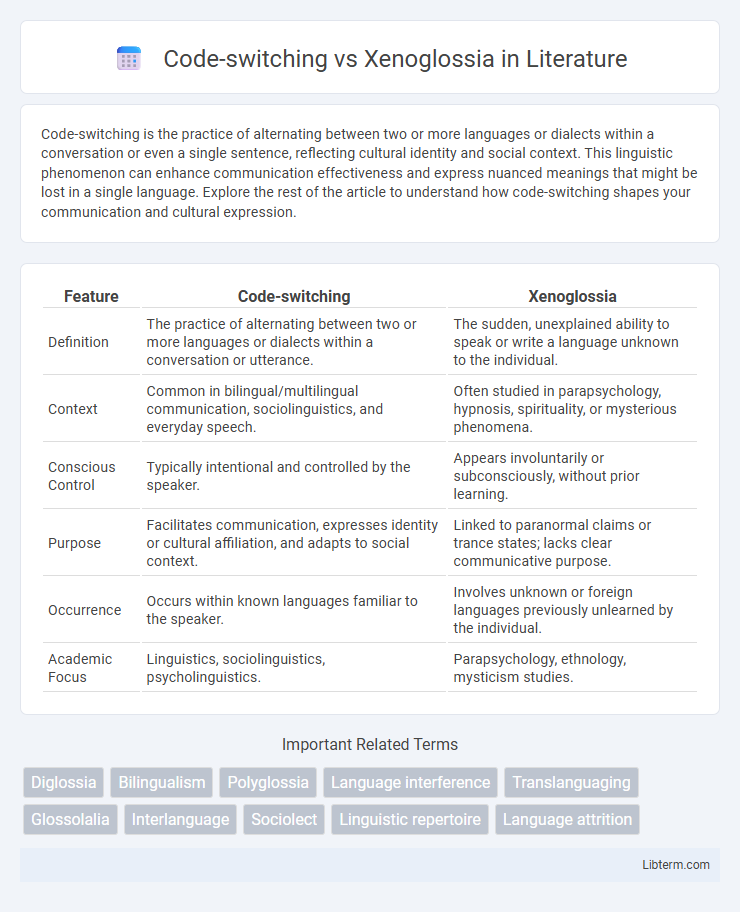Code-switching is the practice of alternating between two or more languages or dialects within a conversation or even a single sentence, reflecting cultural identity and social context. This linguistic phenomenon can enhance communication effectiveness and express nuanced meanings that might be lost in a single language. Explore the rest of the article to understand how code-switching shapes your communication and cultural expression.
Table of Comparison
| Feature | Code-switching | Xenoglossia |
|---|---|---|
| Definition | The practice of alternating between two or more languages or dialects within a conversation or utterance. | The sudden, unexplained ability to speak or write a language unknown to the individual. |
| Context | Common in bilingual/multilingual communication, sociolinguistics, and everyday speech. | Often studied in parapsychology, hypnosis, spirituality, or mysterious phenomena. |
| Conscious Control | Typically intentional and controlled by the speaker. | Appears involuntarily or subconsciously, without prior learning. |
| Purpose | Facilitates communication, expresses identity or cultural affiliation, and adapts to social context. | Linked to paranormal claims or trance states; lacks clear communicative purpose. |
| Occurrence | Occurs within known languages familiar to the speaker. | Involves unknown or foreign languages previously unlearned by the individual. |
| Academic Focus | Linguistics, sociolinguistics, psycholinguistics. | Parapsychology, ethnology, mysticism studies. |
Understanding Code-Switching: Definition and Examples
Code-switching is the practice of alternating between two or more languages or dialects within a conversation or sentence, commonly seen in multilingual communities. It serves various functions such as conveying identity, enhancing communication efficiency, or expressing cultural nuance, with examples including switching from English to Spanish mid-sentence among bilingual speakers. Unlike xenoglossia, which refers to the purported ability to speak a language unknown to the person, code-switching is a conscious, context-driven linguistic behavior grounded in proficiency.
Defining Xenoglossia: Myths vs Reality
Xenoglossia is the alleged ability to speak a language unknown to the speaker, often attributed to supernatural or paranormal phenomena, whereas code-switching involves alternating between languages one fluently knows during communication. Scientific studies reveal that alleged cases of xenoglossia typically result from subconscious memory recall or learned phrases rather than genuine spontaneous foreign language acquisition. Myths surrounding xenoglossia often exaggerate claims, lacking empirical evidence, whereas reality emphasizes linguistic competence and cognitive explanations.
Linguistic Roots: How Code-Switching Occurs
Code-switching occurs when bilingual or multilingual speakers alternate between languages or dialects within a conversation, reflecting cognitive flexibility and social identity. Rooted in sociolinguistics and psycholinguistics, code-switching emerges from language proficiency, context, and communicative intent rather than pathological conditions. Unlike xenoglossia, which involves purported spontaneous or mystical language ability, code-switching is a natural linguistic behavior grounded in real-time language processing and social interaction.
Manifestations of Xenoglossia: Historical Cases
Manifestations of xenoglossia have been documented in historical cases where individuals suddenly speak languages unknown to them, often during trance or hypnosis states, such as the famous 19th-century case of the woman who fluently spoke Swedish despite no prior exposure. These occurrences present a stark contrast to code-switching, which involves consciously alternating between languages within familiar linguistic competence. Historical records emphasize xenoglossia as a rare and unexplained phenomenon, frequently linked to psychological or paranormal interpretations rather than linguistic skill.
Cognitive Processes Behind Code-Switching
Code-switching involves the dynamic alternation between two or more languages or dialects within a conversation, driven by complex cognitive processes such as executive control, language activation, and inhibition. These processes enable bilingual individuals to manage competing linguistic systems by selectively activating one language while suppressing the other, facilitating efficient communication and social interaction. In contrast, xenoglossia refers to the mysterious ability to speak a language without prior knowledge, lacking verified cognitive mechanisms observed in code-switching research.
Psychological and Parapsychological Perspectives on Xenoglossia
Xenoglossia refers to the phenomenon where an individual speaks a language unknown to them, often examined through psychological and parapsychological lenses as evidence of latent memory retrieval or supernatural communication. Psychological perspectives highlight dissociative states or unconscious linguistic competence as potential explanations for xenoglossia. Parapsychological research investigates xenoglossia as possible proof of psychic phenomena, exploring altered states of consciousness and spirit communication influencing language acquisition.
Social Contexts: When and Why Code-Switching Happens
Code-switching commonly occurs in multilingual social environments where speakers alternate languages to signal group identity, accommodate interlocutors, or emphasize a point, reflecting cultural and contextual relevance in communication. It serves practical functions such as easing interaction, expressing solidarity, or negotiating power dynamics within diverse social settings. In contrast, xenoglossia refers to the spontaneous or claimed sudden use of an unknown language, often lacking social communicative intent and instead tied to psychological or paranormal contexts.
Cultural Significance of Code-Switching and Xenoglossia
Code-switching reflects cultural identity and social dynamics within multilingual communities by signaling group membership and adapting to diverse contexts. Xenoglossia, often perceived as a supernatural ability to speak an unknown language, holds cultural and spiritual significance in religious and mystical traditions. Both phenomena illustrate the complex interplay between language, culture, and personal expression across different societies.
Challenges in Studying Code-Switching vs Xenoglossia
Researching code-switching encounters challenges such as identifying the fluid transitions between languages within natural conversation, which often overlap with sociolinguistic cues and personal identity markers. Xenoglossia studies face difficulties in verifying the authenticity of sudden language proficiency claims, complicated by psychological and neurological factors influencing language recall. Both fields require rigorous methodological approaches to differentiate genuine linguistic phenomena from performance or psychological artifacts.
Conclusion: Key Differences and Ongoing Debates
Code-switching involves alternating between languages within a conversation, reflecting bilingual or multilingual proficiency, while xenoglossia refers to the spontaneous use of a language unknown to the speaker, often linked to paranormal claims or psychological phenomena. The key difference lies in the conscious linguistic control in code-switching versus the mysterious, often unexplained nature of xenoglossia. Ongoing debates focus on the legitimacy of xenoglossia as a genuine linguistic ability and its implications for understanding language acquisition and cognitive function.
Code-switching Infographic

 libterm.com
libterm.com